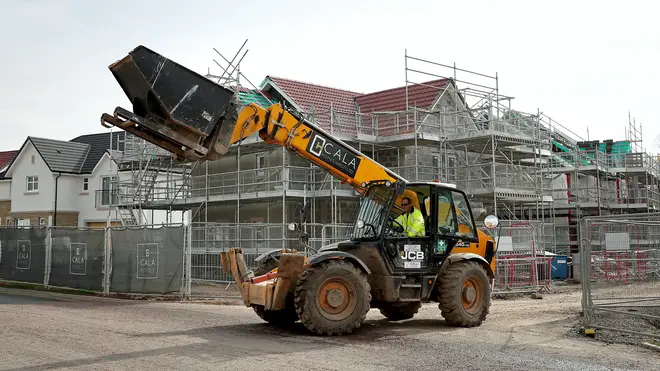
Matt Frei 10am - 12pm
6 August 2020, 05:47

Sweeping reforms to the planning system in England could "could to the creation of the next generation of slum housing", the government has been warned.
The new rules aim to cut red tape and speed up house building, with Housing Secretary Robert Jenrick claiming the major overhaul would protect green spaces while making it easier to build on brownfield sites.
But Labour have branded the move a "developers' charter", and the Campaign to Protect Rural England said it was not clear how much local involvement there would be under the proposed system.
Despite the Government's insistence that the moves would create tree-lined streets and promote "beautiful" buildings, the Royal Institute of British Architects (RIBA) said there was "every chance they could also lead to the creation of the next generation of slum housing".
RIBA President, Alan Jones, said: "While there's no doubt the planning system needs reform, these shameful proposals do almost nothing to guarantee the delivery of affordable, well-designed and sustainable homes.
"While they might help to 'get Britain building' - paired with the extension of permitted development - there's every chance they could also lead to the creation of the next generation of slum housing."

Housing Minister Robert Jenrick explains the new planning process

Prime Minister Boris Johnson and his senior aide Dominic Cummings have both advocated reform to the system and the proposals in the Planning for the Future White Paper published on Thursday set out the Government's vision.
Part of the new process will involve quicker development on land which has been designated "for renewal", with a "permission in principle" approach that the Ministry of Housing, Communities and Local Government (MHCLG) said will balance the need for proper checks with a speedier way of working.
The other two categories will see land designated for growth where new homes, hospitals and schools will be allowed automatically to empower development, while areas of outstanding natural beauty and the green belt will come under the protection category.
Mr Jenrick said it takes seven years to agree local housing plans and five years just to get a spade in the ground, and the proposed changes aim to speed up the process.
He added: "These once-in-a-generation reforms will lay the foundations for a brighter future, providing more homes for young people and creating better quality neighbourhoods and homes across the country.

"We will cut red tape, but not standards, placing a higher regard on quality, design and the environment than ever before."
It also aims to boost the share of houses built by small and medium-sized building firms, which built 40 per cent of new homes 30 years ago but only 12 per cent today.
The White Paper proposes that all new streets should be tree-lined and the MHCLG also says "all new homes to be carbon neutral by 2050, with no new homes delivered under the new system needed to be retrofitted".
Councils will also be forced to lay out a "local plan" of where new homes can be built, as only 50 per cent have such schemes in place.
The reforms aim to reduce the number of planning cases that get overturned at appeal by creating a "clearer, rules-based system".

Schools Minister explains processes to protect children
A new national levy would replace the current system of developer contributions and "beautiful buildings" will be fast-tracked through the planning system.
Shadow housing minister Mike Amesbury said: "This is a developer's charter that will see communities sidelined in decisions and denied vital funding for building schools, clinics and community infrastructure."
Tom Fyans, deputy chief executive of CPRE (Campaign to Protect Rural England), said: "The key acid test for the planning reforms is community involvement, and on first reading it's still not clear how this will work under a zoning system."
The Local Government Association's chairman James Jamieson said nine in 10 applications are approved by councils with more than a million homes given planning permission over the last decade yet to be built and the system should focus on that.
"Any loss of local control over developments would be a concern," the Tory council chief warned.